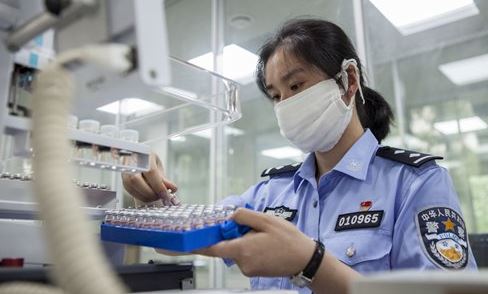
A police officer identifies drugs in a testing room at the Public Security Bureau of Hangzhou, East China's Zhejiang Province. (Photo: IC)
Beautifully packaged chocolates and cookies are so appetizing that you wouldn't think they were drugs. The third-generation of drugs represented by new psychoactive substances (NPS) is now attracting many Chinese youngsters in a more deceptive way. They tend to come mostly from overseas, especially from countries with less stringent drug control laws, said experts.
New psychoactive substances are defined by the UN Office on Drugs and Crime as "substances of abuse, either in a pure form or a preparation, that are not controlled by the 1961 Single Convention on Narcotic Drugs or the 1971 Convention on Psychotropic Substances, but which may pose a public health threat."
In order to escape the crackdown and to confuse the masses, the smuggled substances are commonly hidden in snacks, such as milk tea powder, popping candy and chocolate, making them difficult to discover. For substances which are already regulated in China, suspects can change their molecular structure of to have the item pass testing, Chen Hang, deputy director of the toxicology chemistry laboratory at the Academy of Forensic Science (AFS), told the Global Times.
According to the cases Chen has been exposed to, crimes including producing and selling NPS have been rising in recent years. Most of the suspects are young people, including many highly educated scientific researchers who have the ability to conduct chemical transformations of drugs.
Some commit crimes knowingly, while others chemically alter molecular structures in the name of corporate scientific projects without knowing their real applications.
New Channels
A Japanese prescription drug has become a new favorite of drug dealers, according to Shanghai customs in June. The prescription drug, flurazepam, is targeted by smugglers who seek to smuggle it into China because of its similar or stronger excitatory and hallucinogenic effects when being taken with alcohol. Thirteen gang members have been arrested and 367 flurazepam tablets seized.
Since the beginning of this year, Shanghai customs has detected 13 cases of drug smuggling in international parcels sent from Japan, and has seized a total of 275.49 grams of flurazepam.
Shanghai customs noted that the US, Canada, Japan and other developed countries have become major sources of drugs smuggled into China. In addition, the new drugs are disguised in various ways. Some smugglers turn ecstasy into cartoon-shaped "candies," while others disguise new psychotropic drugs as routine health care products such as vitamins and calcium tablets to confusing customs officers.
Irreversible Harm
Many new psychoactive substances are more toxic than established drugs such as heroin and morphine, said Chen. "NPS has not been tested for clinical safety. Little is known about the adverse health effects and social harm they pose, resulting in a considerable challenge for addiction prevention and treatment."
According to published literature, NPS are highly lethal. Long-term use of these substances can damage the central nervous system and even cause irreversible damage to the hippocampus and memory circuits, Chen elaborated.
For adolescents, the risks can double. NPS abuse may lead to different levels and types of mental disorders, leading to uncontrollable behaviors or, more seriously, can lead people to forget their morals and commit violence or sexual assault, Liu Wei, director of the forensic toxicology laboratory at the AFS, told the Global Times.
A new code
Liu said that NPS contained in e-cigarettes has been epidemic around the world for the past two years. The e-cigarette oil submitted to AFS for testing often contains high-purity synthetic cannabinoids. Such cases are frequent during the summer holidays, and the increased flow of drugs is partly driven by returning overseas students, according to Liu.
To evade discovery, drug-makers will quickly develop new, non-listed psychoactive substances once a certain strain is found to be under control. "The compositions of the new compounds they have created are relatively unknown, so it's like we have to crack a code to decipher the ingredients," Chen told the Global Times.
The emergence and screening of new drugs is a cat-and-mouse game, but the speed of the cat has become faster and faster, Chen said.
China is among international leaders in NPS identification technology despite the surveillance efforts needing to be stepped-up further to prevent an increased domestic spread. China has also adopted the wastewater-based epidemiology technology - commonly used in many countries such as Belgium and Germany - in many cities to detect drug use by analyzing sewage data.
It is also cooperating with developed countries in diversifying forms of drug recognition and control, Chen noted.
China controlled all fentanyl-related analogs in April, in a move that aims to step up efforts to stringently combat the illegal manufacturing, distribution and smuggling of the world's most lethal synthetic opioid.


